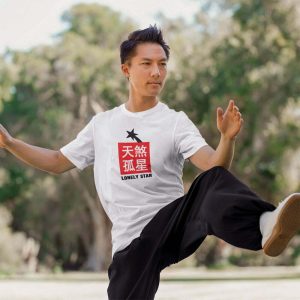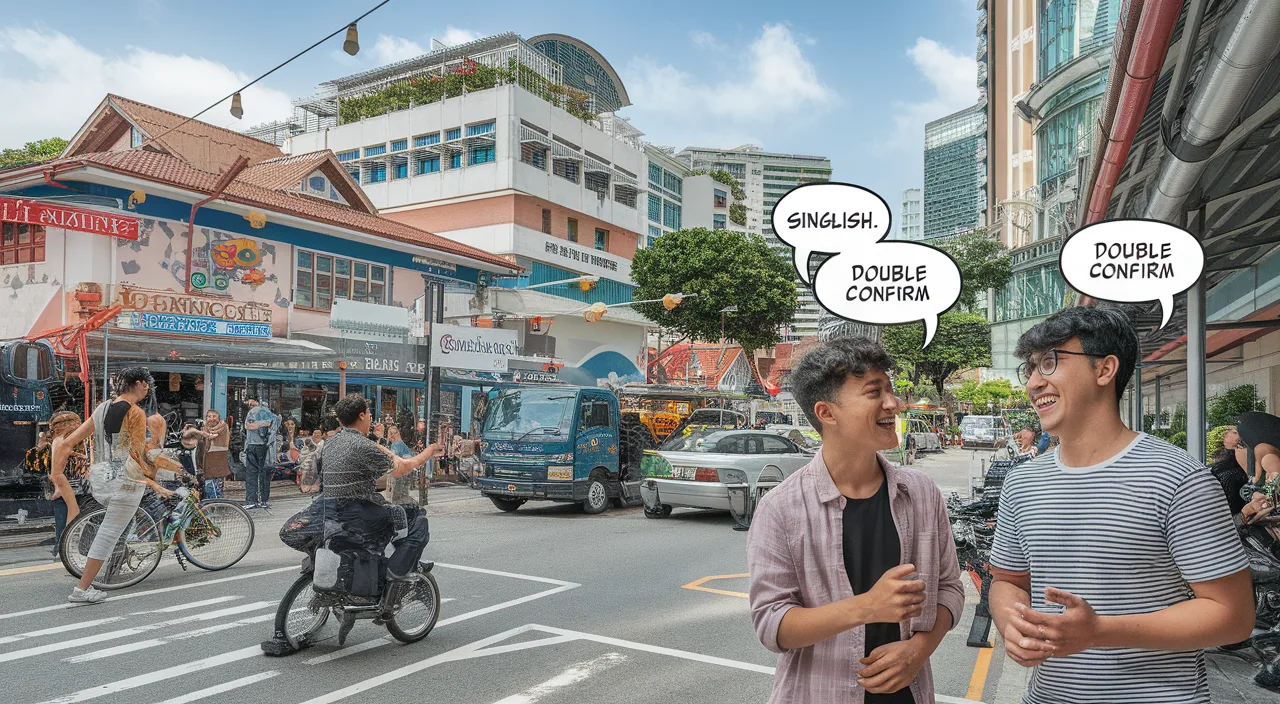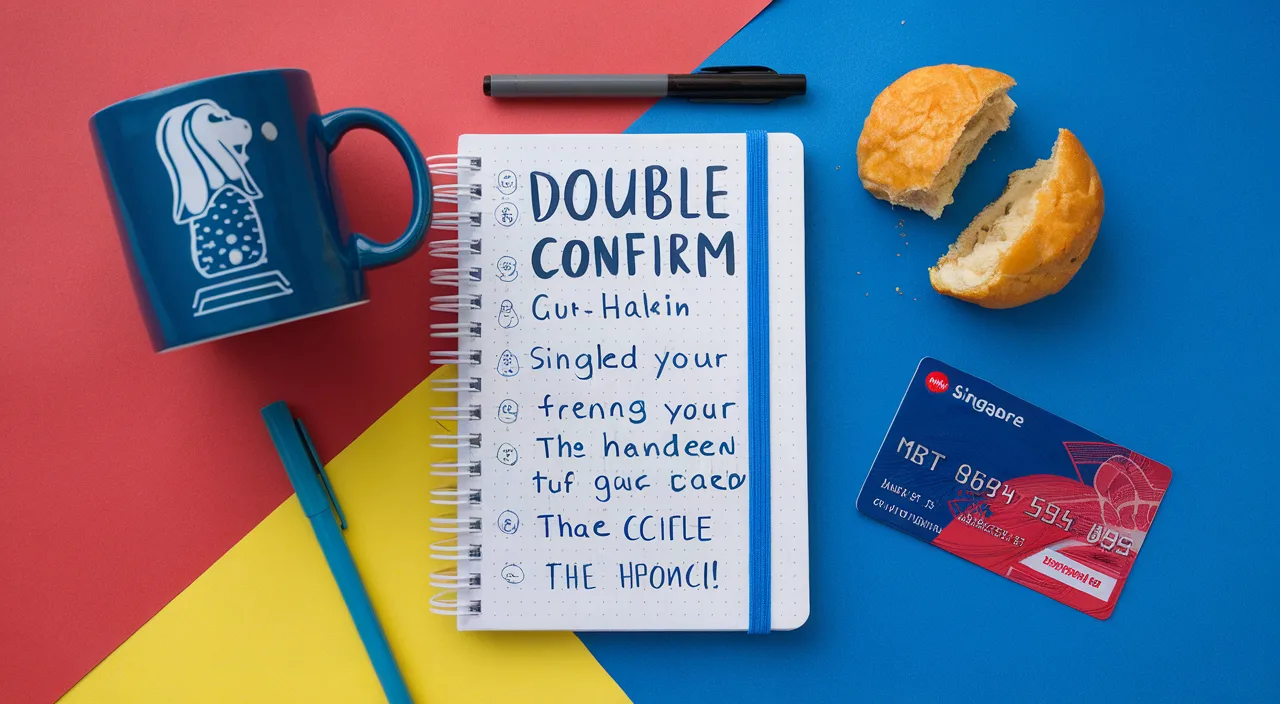Why do Singaporeans say ‘Double Confirm’?
The simple answer? Because one confirm just isn’t enough for us Singaporeans. We don’t take chances when it comes to being absolutely certain. Whether you’re discussing meeting times, confirming exam topics, or placing your lunch order, we want everything to be zhun zhun with no room for cock-ups. That’s why we ‘double confirm’ everything. It’s like checking your EZ-Link card balance twice before tapping – some might call it paranoid, but we call it prudent. This habit reveals the fascinating psychology behind our everyday Singlish expressions.
-
Chinese, Graphic, KaoBeiKing, Quote, T-shirts, Typography, Valentines
Price range: $30.00 through $38.00 Select options This product has multiple variants. The options may be chosen on the product page
Key Takeaways About Singaporean ‘Double Confirm’ Culture:
- ‘Double confirm’ represents peak Singaporean Singlish – it’s more about our cultural need for certainty than poor grammar
- We use this phrase across all contexts, from casual social plans to formal business communications
- The expression stems from our kiasu, kiasi mentality – we’d rather be safe than sorry
- This phrase demonstrates Singlish’s efficiency and emphasis – it’s intentional, not accidental
- While similar expressions exist like “Can or not?” and “You sure or not?”, ‘double confirm’ remains the ultimate verification phrase
Understanding Singlish Culture
To truly understand why Singaporeans say ‘double confirm’, you need to grasp the entire Singlish ecosystem. We’re talking about a remarkable linguistic fusion that combines English, Malay, Hokkien, Teochew, Tamil, and Cantonese – creating the original multicultural communication style long before globalization made it trendy. Understanding Singlish culture means recognizing that this isn’t broken English; it’s an adaptive, expressive, and incredibly efficient way of communicating.
Singlish isn’t just about dropping certain words or mixing languages. It’s rhythmic, emotionally rich, and highly contextual. Take our famous particles like lah, leh, and lor – each carries distinct emotional undertones that can completely change a sentence’s meaning. So when Singaporeans say ‘double confirm’, we’re not being redundant – we’re seeking that extra layer of reassurance that’s deeply embedded in our communication culture.
-
hashtag, KaoBeiKing, Quote, Singlish/Hokkien, T-shirts, Typography
Price range: $30.00 through $38.00 Select options This product has multiple variants. The options may be chosen on the product page -
KaoBeiKing, Parody, Singlish/Hokkien, T-shirts, Typography
Price range: $30.00 through $38.00 Select options This product has multiple variants. The options may be chosen on the product page
The Origin of ‘Double Confirm’ and Other Singaporean Phrases
The phrase ‘double confirm’ didn’t emerge from formal English education or traditional grammar books. This quintessentially Singaporean expression likely originated in our local workplaces and National Service environments – high-pressure, precision-focused settings where mistakes carry serious consequences. When one confirmation feels too risky, we naturally evolved to use two confirmations to cover all bases.
Consider this typical NS scenario: “Oei, your parade timing is 0500 right? Double confirm ah!” Getting this wrong means extra duties and potential punishment, so you learn quickly to verify everything twice. From military culture, ‘double confirm’ gradually spread into civilian life, becoming part of our daily vocabulary. Now you’ll hear it everywhere – WhatsApp group chats, school discussions, wedding planning, even bubble tea orders: “Large size, less ice, double confirm hor?”
This phrase persists because it perfectly serves our multicultural, efficiency-focused, slightly risk-averse society. In Singapore, we prioritize clarity and certainty over brevity. That’s exactly where ‘double confirm’ fits – functioning like a verbal insurance policy that gives everyone peace of mind.
Typical Singaporean Habits and Stereotypes
Our speech patterns directly reflect our behavioral tendencies, and let’s be honest – Singaporeans have some pretty distinctive personality traits. Here’s how our most recognizable characteristics fuel our love for phrases like ‘double confirm’ and shape our communication style.
- Kiasu mentality (fear of losing out): This drives our need to capture every detail and miss nothing important, which naturally leads us to confirm and then double confirm information
- Kiasi attitude (fear of embarrassment): While not literally about death, this reflects our deep anxiety about awkward situations, so we verify everything to avoid potential mishaps
- Efficient yet anxious approach: We love quick decisions and fast results, but we also get nervous about outcomes, leading to rapid choices followed by multiple verification rounds
- Consensus-seeking behavior: We constantly check “Other people confirm or not?” because we’re highly attuned to group agreement – one confirmation feels personal, but double confirmation represents community consensus
This explains why when your manager ends a message with “Confirm can?”, you instinctively reply “Double confirm can.” You’re not just acknowledging the request – you’re participating in our unique office diplomacy culture that values collective certainty over individual confidence.
Top 10 Common Singlish Phrases Like ‘Double Confirm’
If ‘double confirm’ were the VIP guest at Singapore’s linguistic party, these are the other Singlish phrases that would be on the exclusive guest list:
- Can or not? – The ultimate conversation ender that seeks immediate affirmation while leaving room for negotiation
- You sure or not? – Polite skepticism disguised as innocent curiosity, often used when something sounds too good to be true
- Don’t play play (lah) – Emphasizes seriousness while often being used ironically in casual situations
- Confirm plus chop – The gold standard of certainty, implying official approval with signatures and stamps
- Like that also can? – Expresses amazement or disbelief, with meaning heavily dependent on tone and context
- Lah / Lor / Leh – The essential Singlish particles that add emotional nuance to every sentence
- Catch no ball – Admits complete confusion when you’re totally lost in a conversation or situation
- Ngiao – Describes someone who’s being stingy or overly calculative about money or favors
- Bojio – The ultimate expression of betrayal when you discover you weren’t invited to something fun
- Ownself check ownself – Highlights situations where self-regulation becomes meaninglessly circular
All these Singlish phrases embody the same cultural DNA: a healthy dose of skepticism, dramatic flair, and distinctive character that makes our local communication style so uniquely Singaporean. They represent our daily linguistic landscape on this little red dot.
-
Price range: $30.00 through $38.00 Select options This product has multiple variants. The options may be chosen on the product page
-
Chinese, Chinese New Year, Ladies, Mens, T-shirts
Price range: $30.00 through $38.00 Select options This product has multiple variants. The options may be chosen on the product page
Singaporeans Be Like: ‘Double Confirm’, Then What Next?
So what happens after we double confirm something? Here’s where it gets interesting – sometimes even double confirmation isn’t enough, and we escalate to triple confirmation territory. It becomes our final stamp of Singaporean thoroughness. In group chats, more participants means more confirmation rounds, often creating an echo chamber effect: “Everyone okay right?”… “Ya can.” “Can.” “Confirmed.” “Double confirm.” You get a complete verification orchestra playing.
When plans inevitably change despite all our confirmations, that’s when the apologetic messages start flooding in: “Eh paiseh, I thought I double confirmed… got miscommunication somewhere.” This teaches us to be even more thorough next time – adding timestamps, pinning important messages, and sometimes even creating written records for casual plans.
This ‘double confirm’ phenomenon isn’t just amusing local slang – it provides insight into how Singaporeans navigate daily life. We’re cautious yet communal, calculated yet caring. And honestly, there’s something endearing about our collective need for certainty in an uncertain world.
Final Thought
Language reflects identity, and ‘double confirm’ demonstrates that Singaporeans are meticulous, consensus-building people who value clarity over confusion. In our ultra-modern society that juggles cultural diversity, rapid technological advancement, and multilingual communication, Singlish expressions like these serve as both coping mechanisms and badges of cultural pride.
So next time someone asks you to double confirm something, don’t dismiss it as unnecessary redundancy. Respond with your own confirmation, then double confirm back. It’s how we show we care, how we build mutual trust, and how we express our uniquely Singaporean approach to communication and relationships.
Frequently Asked Questions
- 1. Is ‘double confirm’ used in formal scenarios?
Sometimes, yes – especially in emails or meetings. It adds a local touch, but best to use sparingly in very formal settings. - 2. Can ‘double confirm’ be sarcastic?
Definitely. Tone is everything. Sometimes we say it to hint, “You blur or what?” - 3. Is there a difference between ‘confirm plus chop’ and ‘double confirm’?
‘Confirm plus chop’ is more final and dramatic. Like got signature. ‘Double confirm’ feels more like a check-in. - 4. Where did ‘double confirm’ originate?
Likely from army slang or local business jargon, then filtered through schools and daily conversations. - 5. Why are Singaporeans so obsessed with checking things?
Cultural lah – we don’t like mistakes, and we love efficiency. We’re trained to be precise from young. - 6. What’s the English equivalent?
Closest would be “Are you 100% sure?” — but even that doesn’t capture the same feel. - 7. Can foreigners learn and use ‘double confirm’?
Absolutely – but use responsibly and with the right tone. Otherwise malu sia.








